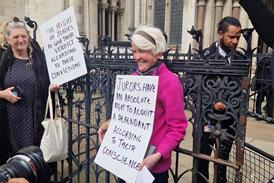Decisions filed recently with the Law Society (which may be subject to appeal)
Helen Mathias Hancock
Application 12246-2021
Admitted 1988
Hearing 15 November 2021
Reasons 1 December 2021
The SDT ordered that the respondent should pay a fine of £15,000. The respondent had, on 9 July 2014, by driving after consuming alcohol over the prescribed limit contrary to section 5(1)(a) of the Road Traffic Act 1988 and Schedule 2 to the Road Traffic Offenders Act 1988, breached principle 6 of the SRA Principles 2011.
She had, on 13 November 2019, by failing to provide a specimen of breath to the police in the course of an investigation into whether she had committed an offence under section 3A, 4, 5 or 5A without reasonable excuse to do so, contrary to section 7(6) of the Road Traffic Act 1988 and Schedule 2 to the Road Traffic Offenders Act 1988, breached principles 1, 2 and 6 of the Principles.
On 13 November 2019, by failing to stop after an accident whereby damage was caused to another vehicle, contrary to section 170(4) of the Road Traffic Act 1988 and Schedule 2 to the Road Traffic Offenders Act 1988, the respondent had breached principles 1, 2 and 6 of the Principles.
The respondent had failed to report the above convictions to the SRA, in circumstances where she had an obligation to comply with her legal and regulatory obligations and deal with her regulators in an open, timely and cooperative manner, thereby failing to comply with outcome 10.3 of the Solicitors Code of Conduct 2011 and breaching principles 6 and 7 of the 2011 Principles, and breaching rule 7.6(a) of the SRA Code of Conduct for Solicitors 2019, and principle 2 of the SRA Principles 2019.
The parties invited the SDT to deal with the allegations against the respondent in accordance with a statement of agreed facts and outcome.
The respondent had been unaware of the need to report her 2014 conviction, and had intended to report her 2019 conviction but had not yet done so when the prosecuting authority notified the SRA. She had pleaded guilty to the criminal charges at the first available opportunity, and had completed the sentences imposed. Her medical conditions were a factor in her offending.
In all the circumstances, a financial penalty was the appropriate sanction, and a fine in the sum of £15,000 as proposed by the parties was proportionate, reflecting the seriousness of the respondent’s misconduct.
The respondent was ordered to pay costs of £1,286.
Caroline Jones and Hillyer McKeown LLP
Application 12262-2021
Hearing 27 October 2021
Reasons 16 November 2021
The SDT ordered that the first respondent (admitted 2006) should pay a fine of £7,000, and that the second respondent should pay a fine of £10,000.
The first respondent had failed to provide adequate advice to clients on the risks of Stamp Duty Land Tax avoidance schemes, thereby breaching rules 1.04, 1.05 and 1.06 of the Solicitors Code of Conduct 2007 and principles 4, 5 and 6 of the SRA Principles 2011.
She had improperly sought to limit liability in respect of claims and/or limit the time frame in which a claim could be made, thereby breaching rules 1.04, 1.05, 1.06 or 2.7 of the 2007 code and principles 4, 5 and 6 of the Principles, and failing to achieve outcomes 1.1, 1.2 and 1.8 of the SRA Code of Conduct 2011.
She had failed to tell certain lender clients that purchaser clients intended to use an SDLT avoidance scheme, thereby breaching rules 1.04, 1.05, and 4.02 of the 2007 code, and principles 4, 5 and 6 of the Principles, and had failed to achieve any or all of outcomes 1.1 and 4.2 of the 2011 code.
When acting for purchaser and lender clients, she had improperly transferred purchase sums to a third party, thereby breaching rules 1.04, 1.05 and 4.02 of the 2007 code, and principles 4, 5, 6 and 10 of the Principles, and failing to achieve outcomes 1.2 and 1.12 of the 2011 code.
She had acted where there was a conflict of interest between the purchaser and lender clients, thereby breaching rules 1.04, 1.05 and 1.06 of the 2007 code, and principles 4 and 5 of the Principles, and failing to achieve outcome 3.5 of the 2011 code.
She had failed to comply with rules 22, 32(1) and (2) and 32 (viii) of the Solicitors Accounts Rules 1988, and rules 20 and 29 of the SRA Accounts Rules 2011.
The second respondent had failed to provide adequate advice to clients on the risks of SDLT avoidance schemes, thereby breaching rules 1.04, 1.05 and 1.06 of the 2007 code, and principles 4, 5 and 6 of the Principles.
The second respondent had improperly allowed the attempt to limit liability in respect of the amount of claims and/or the time frame in which a claim could be made, thereby breaching rules 1.04,1.05, 1.06 and 2.7 of the 2007 code, and principles 4, 5 and 6 of the Principles, and failing to achieve outcomes 1.1, 1.2 and 1.8 of the SRA Code of Conduct 2011.
The second respondent had failed to tell certain clients that purchaser clients intended to use an SDLT avoidance scheme, thereby breaching rules 1.05 and 4.02 of the 2007 code, and principles 4, 5 and 6 of the Principles, and had failed to achieve outcomes 1.1 and 4.2 of the code.
The second respondent had caused or allowed the first respondent to improperly transfer purchase sums to a third party, thereby breaching rules 1.04, 1.05, 4.02 of the 2007 code, and principles 4, 5, 6 and 10 of the Principles, and failing to achieve outcomes 1.2 and 1.12 of the code.
The second respondent had caused or allowed a conflict of interest to arise between the purchaser client and the lender client, thereby breaching rules 1.04, 1.05 and 1.06 of the 2007 code and principles 4 and 5 of the Principles, and failing to achieve outcome 3.5 of the code.
The second respondent had caused or allowed the first respondent to fail to comply with rules 22, 32(1), (2) and 32(viii) of the Solicitors Accounts Rules 1998.
The second respondent had caused or allowed the first respondent to fail to comply with rules 22, 32(1), (2) and 32(viii) of the 1998 rules, and rules 20 and 29.1 of the SRA Accounts Rules 2011 and the 1998 rules.
The parties had invited the SDT to deal with the allegations against the respondent in accordance with a statement of agreed facts and outcome.
The matter was moderately serious as the respondents ought to have been aware of the Warning Notices and of the caution that should have been taken when dealing with the SDLT schemes. The practice had come to an end before the SRA investigation.
The first and second respondents were each ordered to pay costs of £15,000.


















![David Lester (senior partner at Blythe Liggins), Darryl Barnes, Jagdeep Sandher (head of dispute resolution at Blythe Liggins)[4]](https://d1d8vslyhr7rdg.cloudfront.net/Pictures/274x183/4/2/8/116428_davidlesterseniorpartneratblytheligginsdarrylbarnesjagdeepsandherheadofdisputeresolutionatblytheliggins4_981603_crop.jpg)







